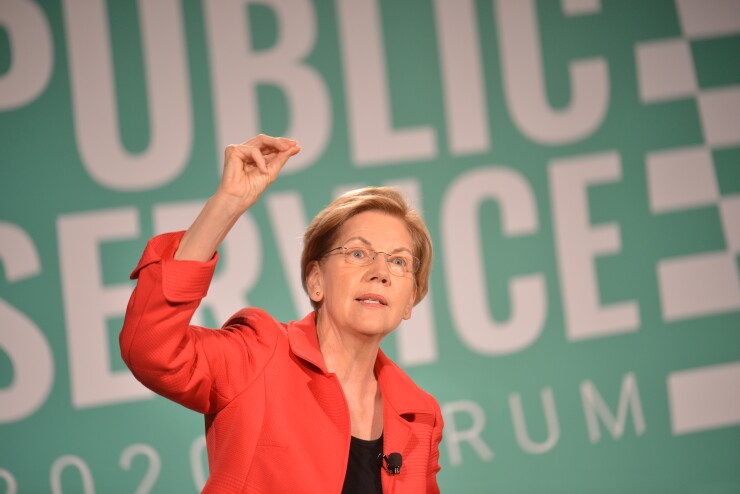WASHINGTON — It’s a scene everyone braces for on the Senate Banking Committee. An executive or Trump-appointed regulator sits in a witness chair pondering how tough the questions will be, and Sen. Elizabeth Warren, D-Mass., enters the room.
After Wells Fargo announced millions of fake accounts were opened in customers’ names, former CEO John Stumpf faced Warren at a September 2016 hearing where she called on him to resign. Less than a month later, he did. At a hearing the following year, she grilled Stumpf's successor, Tim Sloan, who has since left the bank.
She has similarly taken regulators to task, rarely mincing words. At a hearing last year for Consumer Financial Protection Bureau Director Kathy Kraninger, then the nominee to run the agency, Warren said Kraninger's alleged involvement in the administration's border family separation policy is "a moral stain that will follow you for the rest of your life."
But with Warren now on the presidential campaign trail, her presence on the Banking Committee has been more muted. She missed an opportunity last month to question Facebook executive David Marcus over the company's much-criticized cryptocurrency plan, and was also absent at the committee's most recent hearing with Federal Reserve Chairman Jerome Powell.

“To the extent that industry reps are up there … and she’s not there to question them, there is some relief,” said Brian Gardner, a policy analyst at KBW.
Warren’s last public appearance at the Senate Banking Committee was in May, when she
The full committee has held 13 public meetings since then, without Warren being in the room. Observers say her absence has been felt, with the tone of Democratic questioning less severe.
“Her lack of a presence ... in the committee probably has altered the conversation a little bit,” a former senior Senate staffer said. “It’s one less potential challenge that banks have to face."
It is not the first time that a high-profile Banking Committee member has taken to the campaign trail.
Former Senate Banking Committee Chairman Chris Dodd, D-Conn., was criticized for abandoning his committee responsibilities when he ran to be the Democratic nominee in the 2008 election.
“Chris Dodd took a fair amount of flak for very little activity and being gone a lot,” the former senior Senate staffer said. “I think that criticism takes on a different tone or different impact when it’s the chair.”
Warren's time away from the committee was particularly noteworthy following Facebook's June announcement of its plan to roll out the Libra cryptocurrency. She missed Powell's semiannual visit to Capitol Hill on July 11, when he questioned Facebook's plans, and Marcus' testimony the following the week. In March, Warren had proposed breaking up the biggest tech giants.
While Warren is on the campaign trail, her aides say she is still holding the industry and Trump-appointed regulators accountable. One tool that Warren has is to send industry officials and agency heads letters with "questions for the record" that require them to respond.
“Sen. Warren has submitted QFRs for Banking Committee hearings she has not been able to attend,” one aide told American Banker.
Yet Warren's absence does not mean witnesses coming before the committee are getting off the hook.
“I think any financial executive, banker or nonbanker, who thinks he or she will have an easier time on Senate Banking because Sen. Warren is on the campaign trail is a mistake,” said Karen Shaw Petrou, managing partner at Federal Financial Analytics. “I think you can count on her to return if there is a headline hearing.”
Gardner said bankers would not "totally escape tough questioning" since Warren "has several allies on the committee like ranking member Sen. [Sherrod] Brown."
Others say Warren has drawn more attention to her tough regulatory proposals as a presidential candidate, such as a sweeping
“If some people view [Warren's absence in the Senate] as a better situation for industry witnesses, I wonder if that's been offset somewhat by her use of the presidential campaign to raise issues," said the former Senate staffer.
On the campaign trail, Warren has introduced plans to require executives to serve time in jail when their companies commit crimes, padlock the revolving door between the government and industry lobbying, and overhaul the Community Reinvestment Act.
An industry source, speaking on the condition of anonymity, said Warren's recent letter writing has appeared to be more directed toward the regulators than bank executives.
“I think letter writing is definitely something that she has used as a tool over the years to pressure maybe not the industry as much as the regulators,” the source said.
The person said much of the industry's focus when it comes to congressional oversight has shifted toward the Democratic-controlled House, rather than the Republican Senate. But industry executives shouldn’t go into hearings without preparing for Warren-style questions.
“Anybody that’s preparing for these types of hearings is expecting that her staff would be giving the same questions to … any of the other folks that have a long history of consumer advocacy,” the person said.
Gardner added that Warren's "questions for the record" letters may not carry the same weight as the sound bites that follow Warren’s public questioning of witnesses at hearings.
“Videos sting more powerfully than thousands of letters from Senate offices,” Gardner said.
With Warren on the campaign trail, some bankers say they aren’t as much of a target as other industries. They say banks are more capitalized than they were during the financial crisis.
“I think [Warren has] changed her tune. … I think she is looking more towards health care and immigration instead of bashing a core tenet of the economy of the U.S.,” said another industry source.
"The public is trusting banks to help them with their financial needs and understand they are much [more] well capitalized,” the source said.





